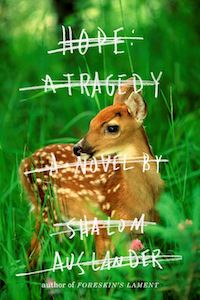Surviving History
What would it be like to discover Anne Frank, that most beloved and celebrated victim of the Holocaust, living in your attic?
“Hope: A Tragedy”
A book by Shalom Auslander
What would it be like to discover Anne Frank, that most beloved and celebrated victim of the Holocaust, living in your attic? For Solomon Kugel, protagonist of “Hope: A Tragedy,” the debut novel by Shalom Auslander (author of the uproarious “Foreskin’s Lament,” a memoir of growing up in a strict Orthodox Jewish household, and the similarly irreverent short story collection “Beware of God”), it’s a pretty big bummer. “While there’s never a good time to find Anne Frank in your attic,” an omniscient narrator helpfully explains, “this was a particularly bad time.”
Kugel likes the old farmhouse that he just bought in rural Stockton, N.Y., but he needs to rent out both ground-floor bedrooms to cover the mortgage. Unfortunately, his paranoid mother, who believes (wrongly) that she is a Holocaust survivor and that another genocide of the Jews is in the offing, has moved into one of the rooms, straining Kugel’s relationship with his wife, Bree. Meanwhile, the tenant who has rented the second bedroom has been complaining about needing some attic space for his stuff, and about Kugel’s mother’s tendency to usher in the morning with God-awful shrieks.
Kugel is a pretty timorous guy. But having determined that the infernal tapping sound keeping him awake nights emanates from above, he musters the courage to pull down the attic door and ascend the stairs. He expects to find a rodent of some kind, or perhaps an arsonist. Indeed, somebody has been systematically burning down farmhouses all over Stockton, and Kugel is doing his best to remain vigilant.
Instead of a rat or some wild-eyed psychopath, he finds Anne Frank. Apparently, she survived Bergen-Belsen, and at some point made her way to the States. She’s been up in this attic for decades working on a novel, and won’t leave until she’s finished. Kugel desperately wants to get rid of her, but realizes that people would be outraged to learn that a Jew had turned Anne Frank out of his house. He’ll have to adopt a more insidious strategy. “He’d play Wagner. He’d get a German shepherd. When the UPS man had gone, he’d tell her it had been a man from the Gestapo, asking a lot of questions. A lot of questions.”
Just when you think Auslander couldn’t get any more outrageous, he does. “Did you shower yet, honey? he would call downstairs to Bree. Because if you showered already I’m going to shower now.”
One cannot but suspect that Auslander would not be able to get away with such fiendishly mischievous humor were he not Jewish. And there is something opportunistic about exploiting this situation to make as many jokes as possible about Anne Frank. Indeed, if there were nothing more to the novel, it would have to be considered a failure — albeit a wickedly funny one. But Auslander is not simply out to provoke shock and laughter by being flippant. The underlying intent of “Hope: A Tragedy” is to examine the possibility of escaping the crushing burden of history. This Auslander manages through an unexpectedly successful combination of endearing crassness and profound psychological insight.
With his short story collection and memoir, Auslander developed a reputation for wit-laced pessimism. Here, he outdoes himself. “Hope: A Tragedy” derives its title from the observations of one “professor” Jove, whom Kugel began consulting a year earlier to ease the anxiety and anger that remained after his young son recovered from a life-threatening illness. Jove has been patiently explaining to Kugel that hope is the cause of all human misfortune. According to Jove, the irrational belief that one can improve anything in this world inevitably results in failure and disappointment. He considers Hitler, Stalin, Mao and Pol Pot to have been fervent optimists who embarked on their experiments in mass murder in the hope that they would make the world a better place.
| To see long excerpts from “Hope: A Tragedy” at Google Books, click here. |
This is all a bit much for Kugel. He’s a pretty morbid guy, spending a good deal of his free time coming up with epigrammatic last words — for himself — and contemplating different ways of dying. But despite his knowledge that death is inevitable, he doesn’t long for it. And he’s not so sure that a life without hope is a good idea. Throughout the story, Kugel wrestles with his ambivalence toward Jove’s lugubrious Weltanschauung.
Just about everybody in “Hope: A Tragedy” is grappling with the past. Kugel’s mother feels guilty for not having lived and suffered through the Holocaust — so she convinces herself that she has. Anne Frank survived the Holocaust only to discover that she was famous for having died in it. (When she showed up at her publisher’s office several years after the end of the war, he told her: “Stay dead.”) She has spent the decades since trying to write a book that would outshine her diary. Through Kugel’s mother’s obsession and Frank’s ambition, Auslander makes repeated digs at the centrality of the Holocaust in contemporary American Jewish life. As a Jew today, Kugel’s mother feels no need to identify with Judaism or the (Ashkenazi) Jewish culture of her origins. Instead, she is drawn to an event that devastated European Jewry, but that she was fortunate enough to have never experienced. Meanwhile, a cantankerous Frank complains: “I think never forgetting the Holocaust is not the same thing as never shutting up about it. I’d like to scratch Abraham Foxman’s eyes out.”
During the years Frank spent in other people’s attics — on both sides of the Atlantic –those of her (inadvertent) hosts who treated her best were German or German-American. They were filled with shame and guilt over what their parents or ethnic kin had done, and wanted desperately to atone for the crimes of others. Frank found herself feeling sorry for them. In a wry reference to the Torah’s view of inherited guilt, Auslander has her exclaim: “The sins of the father shall be visited upon the sons. What an abominable idea! Who said that?”
And then there’s Solomon Kugel. He had hoped — here, Jove would already be shaking his head — to find “a home unburdened by the past, unencumbered by history.” Stockton, “famous for nothing,” and the farmhouse he buys seem to fit the bill.
No such luck. Even without Frank reminding him of the past, he has his mother. And while Kugel dismisses her paranoid fear of another Holocaust, he can’t stop himself from wondering whether he and his family would find refuge in the event of a genocide. He asks his colleagues at work if they would help out “if something happened” and he and the family — with their dog — needed a place to hide.
“Of the seven people in his office Kugel asked that day if they would let him and his family hide in their attic, three said they had a lot of shit up there, one said he would love to but was allergic to dogs, one said he didn’t have an attic but Kugel could stay in his garden shed (on condition that, if discovered, Kugel would back up his claim of ignorance), and one said he could probably stay in his attic, but he didn’t want to commit to anything at the moment and Kugel should ask again when the time came.”
In one of several thought-provoking asides, Kugel wonders whether forgetting the past entirely might be best — especially when it comes to age-old religious and ethnic animosities.
“Kugel had read that the war in the Balkans was referred to as the War of the Grandmothers; that after fifty years of peace, it was the grandmothers who reminded their offspring to hate each other, the grandmothers who reminded them of past atrocities, of indignities long gone. Never forget! shouted the grandmothers. So their grandchildren remembered, and their grandchildren died.”
Kugel doesn’t have the luxury of being ignorant of his community’s past. Indeed, although Anne Frank is a real character in the book, Auslander clearly intends that she also be a metaphor for the past’s stubborn resistance to banishment. Your people’s history will remain in the back of your mind — your mind’s attic, as it were — whatever you do and wherever you go. And so it is with Kugel; he has come to know quite a bit about human depravity and Jewish suffering. Yet he decides — against Jove’s counsel — to hope for the best. And sure enough, that second Holocaust predicted by Kugel’s mother fails to materialize. But hope is a tragedy, so you know that it will require of Kugel a great sacrifice, one that may remove him from a world more than willing to forsake him, but that he is not quite ready to forsake. Kugel’s hope that he can transcend the past makes for a rousing act of bravura in the face of rampant indifference, cruelty, cynicism and pessimism, as well as a remarkable coda to an unremarkable life.
Your support matters…
Independent journalism is under threat and overshadowed by heavily funded mainstream media.
You can help level the playing field. Become a member.
Your tax-deductible contribution keeps us digging beneath the headlines to give you thought-provoking, investigative reporting and analysis that unearths what's really happening- without compromise.
Give today to support our courageous, independent journalists.







You need to be a supporter to comment.
There are currently no responses to this article.
Be the first to respond.